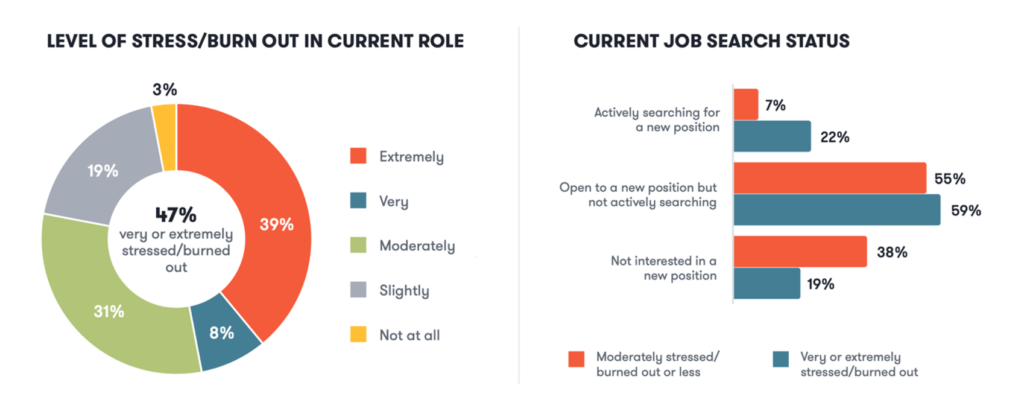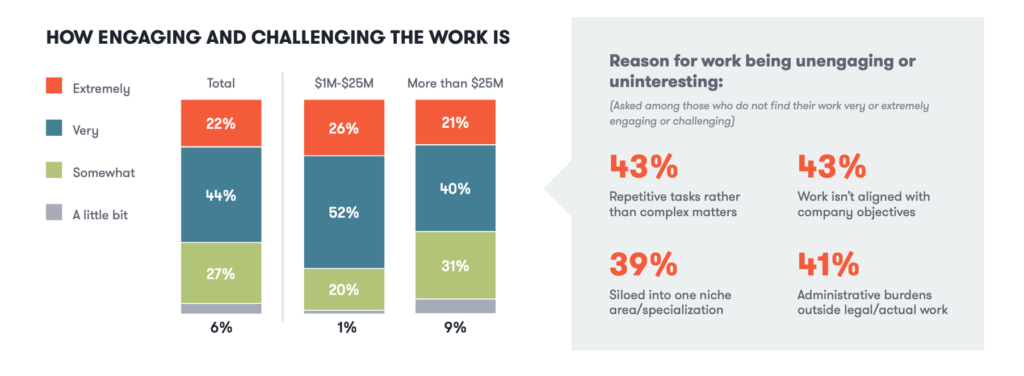
Just under half of inhouse counsel (47%) are either very or extremely ‘burned out / stressed’, yet only 22% of those who feel this way are ‘actively searching’ for a new role, a survey by flexible lawyer provider, Axiom, has found.
And of the same group, who were based in the US, 19% were ‘not interested’ in a new position, despite how things were for them. Although 59% were ‘open’ to one, but they were not actually actively looking to leave. In short, we’ve got a lot of frazzled people stuck where they are, which given the understandably slow pace of change in some inhouse legal teams, e.g. in adopting tech that may help to remove process work, seems to be an unhealthy scenario for all involved.
One would assume that if people are really exhausted after what has been a seriously frenetic few years then they may want to change roles – and it looks like the next year or two are going to be no less chaotic for corporations, i.e. no end in sight for the current pressures. But, as the data shows, they are not charging out of the exit doors.

Here are some potential reasons why people are not moving:
- Recession Fears – As we contemplate an impending recession, people who may want to leave are staying put as they seek security over quality of life. (Of course, one could argue that if you want a better quality of life, if you keep sitting where you are and waiting for ‘the right moment’ then it’s never going to come, because there will always be new demands at work and the world will rarely offer a natural pause.)
- Golden Handcuffs – That although we often dream of having a better lifestyle we can become habituated to the income and prestige of a certain job and don’t want to lose that. When balanced against stress and burnout, plenty of people will stay in their roles even if it’s not good for them (and yes, we all know that’s nuts, but we all also know this happens all the time). Of course, one answer is to keep that role but find a way of doing it that is less crushing. (And it’s worth adding that younger people do appear to be more willing to walk away from the money and unlock the handcuffs, so there’s hope.)
- Inertia – Beyond golden handcuffs there is simply the very human characteristic of inertia. Leaving means making a big decision, looking for a new role – with all the disruption that could cause, and then having to adapt to a new environment with new colleagues and a new boss, and face new demands. Given that inhouse lawyers will be incredibly busy it’s a lot easier to just keep going. Again, this may not be in the person’s best interests, but we don’t always do what’s best for us.
- Normalisation – That despite lawyers feeling burned out, they have normalised this scenario, and some have perhaps looked at other professions and parts of the economy and decided that exhaustion is not a sufficient reason to leave. For example, the American Psychological Association states that ‘36% [of US employees] have reported cognitive weariness, 32% reported emotional exhaustion, and 44% reported physical fatigue’. I.e. they’ve come to the unfortunate conclusion that ‘work = chronic exhaustion’ and you just have to accept it – despite the obvious negative impacts this has on physical and mental health, those around them, and also raises the potential for mistakes and risk creation inside a business.
The other finding was that if you work at a larger company in an inhouse role you are less likely – on average – to be satisfied with the work you do.
The data shows that people working in companies with $25m or less in revenues, were more often ‘very or extremely’ engaged with their work, compared to larger companies, at a difference of 78% for smaller businesses compared to 61% for large businesses.

This makes sense, as smaller companies will likely rely on more of the staff in their legal teams for business-critical needs. Whereas once a company grows to a very large size more and more of the inhouse team are bogged down in operational matters due to the sheer volume of demands on their time, e.g. giving sales contracts approvals, but not being involved in more interesting areas of work. I.e. task specialisation in large organisations can see more lawyers stuck with less interesting work for a long time.
Axiom also, understandably, noted that 39% of inhouse lawyers are looking at flexible talent providers in cases where they want to jump ship – and that does indeed appear to be a good move for those who want more control over their lives.
Last point, what has this got to do with legal tech? If people are exhausted and bored because of too much process work….then what can be done? They can outsource it, or they can bring in tech to help – and perhaps do a bit of both. Tech eats inefficiency for breakfast. If companies want to solve the above problems then tech is clearly part of the answer.
A more flexible working life may help as well.
—
The report can be found here.
Demographics: The Axiom survey was conducted by Wakefield Research among 300 US in-house counsel working at organisations with a minimum annual revenue of $1M between May 23rd and June 3rd, 2022.
1 Trackback / Pingback
Comments are closed.